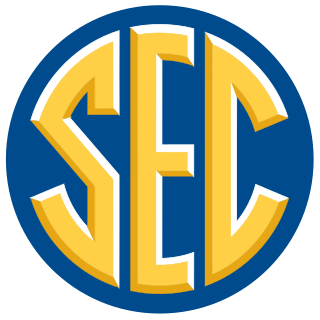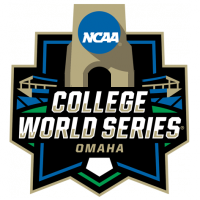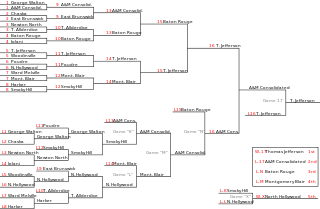
The Southeastern Conference (SEC) is an American college athletic conference whose member institutions are located primarily in the South Central and Southeastern United States. Its fourteen members include the flagship public universities of ten states, three additional public land-grant universities, and one private research university. The conference is headquartered in Birmingham, Alabama. The SEC participates in the National Collegiate Athletic Association (NCAA) Division I in sports competitions; for football it is part of the Football Bowl Subdivision (FBS), formerly known as Division I-A.

The College World Series (CWS), officially the NCAA Men's College World Series (MCWS), is an annual baseball tournament held in June in Omaha, Nebraska. The CWS is the culmination of the National Collegiate Athletic Association (NCAA) Division I Baseball Championship tournament—featuring 64 teams in the first round—which determines the NCAA Division I college baseball champion. The eight participating teams are split into two, four-team, double-elimination brackets, with the winners of each bracket playing in a best-of-three championship series.

A double-elimination tournament is a type of elimination tournament competition in which a participant ceases to be eligible to win the tournament's championship upon having lost two games or matches. It stands in contrast to a single-elimination tournament, in which only one defeat results in elimination.
There are a number of formats used in various levels of competition in sports and games to determine an overall champion. Some of the most common are the single elimination, the best-of- series, the total points series more commonly known as on aggregate, and the round-robin tournament.
The NCAA Division I Baseball Championship is held each year from May through June and features 64 college baseball teams in the United States, culminating in the eight-team College World Series at TD Ameritrade Park Omaha in Omaha, Nebraska. Mississippi State is the 2021 NCAA Division I Baseball Tournament champion, defeating runner-up Vanderbilt 9-0 in Game 3 to win the 2021 College World Series championship finals.

The Southeastern Conference Baseball Tournament is the conference tournament in baseball for the Southeastern Conference (SEC). It is a partially double-elimination tournament and seeding is based on regular season conference records. The winner receives the conference's automatic bid to the NCAA Division I Baseball Tournament. The SEC Tournament champion is separate from the conference champion. The conference championship is determined solely by regular season record.
The Atlantic Coast Conference Baseball Tournament, sometimes referred to simply as the ACC Tournament, is the conference championship tournament in baseball for the Atlantic Coast Conference (ACC). In 2017, the event adopted a modified twelve-team pool play format. The winner receives the conference's automatic bid to the NCAA Division I Baseball Tournament.
The 2001 Big 12 Conference Baseball Tournament was held at AT&T Bricktown Ballpark in Oklahoma City, OK from May 17 through May 21. Nebraska won their third tournament in a row and earned the Big 12 Conference's automatic bid to the 2001 NCAA Division I Baseball Tournament. The tournament mirrored the format of the College World Series, with two 4-team double-elimination brackets and a final championship game.
The 2002 Big 12 Conference Baseball Tournament was for the first time held at Rangers Ballpark in Arlington in Arlington, TX from May 22 through May 26. Texas won their first tournament and earned the Big 12 Conference's automatic bid to the 2002 NCAA Division I Baseball Tournament. The tournament mirrored the format of the College World Series, with two 4-team double-elimination brackets and a final championship game. 2002 set an NCAA record for attendance at a conference tournament, with 150,196 people attending the 5-day event.
The 2003 Big 12 Conference Baseball Tournament was once again held at AT&T Bricktown Ballpark in Oklahoma City, OK from May 21 through May 25. Texas won their second consecutive tournament and earned the Big 12 Conference's automatic bid to the 2003 NCAA Division I Baseball Tournament. The tournament mirrored the format of the College World Series, with two 4-team double-elimination brackets and a final championship game.
The 2004 Big 12 Conference Baseball Tournament was held at Ameriquest Field in Arlington in Arlington, TX from May 26 through May 30. The Cowboys of Oklahoma State University won their first tournament and earned the Big 12 Conference's automatic bid to the 2004 NCAA Division I Baseball Tournament. The tournament mirrored the format of the College World Series, with two 4-team double-elimination brackets and a final championship game.
The 2005 Big 12 Conference Baseball Tournament was held at AT&T Bricktown Ballpark in Oklahoma City, OK from May 25 through May 29. Nebraska won their fourth tournament in seven years and earned the Big 12 Conference's automatic bid to the 2005 NCAA Division I Baseball Tournament. This was the last year that the tournament mirrored the format of the College World Series, with two 4-team double-elimination brackets and a final championship game.
The Conference USA Baseball Tournament is the conference championship tournament in baseball for Conference USA (C-USA). The winner of the tournament receives an automatic bid to the NCAA Division I Baseball Tournament. The tournament format, which has changed several times, currently consists of an eight-team double-elimination tournament format, in which the winners of two four-team brackets play in a single-game final. Rice, which has won the tournament seven times, is the most successful team in the tournament's history.
The 2011 Big 12 Conference Baseball Tournament was held at RedHawks Ballpark in Oklahoma City, OK from May 25th to May 29th, 2011. After five years using the round robin tournament setup, the 2011 Big XII Tournament switched back to the format used from 1999 to 2005, which consisted of two separate four-team double-elimination tournaments. The winners of each of those tournaments faced each other in a one-game match for the championship. Missouri and Texas A&M faced each other in the championship game on Sunday, May 29, 2011. Texas A&M beat Missouri 10-9 in 10 innings to win the 2011 Big XII Tournament. As the conference tournament champion Texas A&M earned an automatic bid to the 2011 NCAA Division I Baseball Tournament. This was the second consecutive year that Texas A&M won the conference tournament in extra innings on a walk-off home run.
The 1992 NCAA Division I Baseball Tournament was played at the end of the 1992 NCAA Division I baseball season to determine the national champion of college baseball. The tournament concluded with eight teams competing in the College World Series, a double-elimination tournament in its forty sixth year. Eight regional competitions were held to determine the participants in the final event. Each region was composed of six teams, resulting in 48 teams participating in the tournament at the conclusion of their regular season, and in some cases, after a conference tournament. The forty-sixth tournament's champion was Pepperdine, coached by Andy Lopez. The Most Outstanding Player was Phil Nevin of Cal State Fullerton. As of 2021, this is the last tournament in which no SEC teams have managed to advance to the College World Series.
The 1989 NCAA Division I Baseball Tournament was played at the end of the 1989 NCAA Division I baseball season to determine the national champion of college baseball. The tournament concluded with eight teams competing in the College World Series, a double-elimination tournament in its forty third year. Eight regional competitions were held to determine the participants in the final event. Each region was composed of six teams, resulting in 48 teams participating in the tournament at the conclusion of their regular season, and in some cases, after a conference tournament. The forty-third tournament's champion was Wichita State, coached by Gene Stephenson. The Most Outstanding Player was Greg Brummett of Wichita State.
The 1987 NCAA Division I Baseball Tournament was played at the end of the 1987 NCAA Division I baseball season to determine the national champion of college baseball. The tournament concluded with eight teams competing in the College World Series, a double-elimination tournament in its forty first year. Eight regional competitions were held to determine the participants in the final event. Each region was composed of six teams, resulting in 48 teams participating in the tournament at the conclusion of their regular season, and in some cases, after a conference tournament. The forty-first tournament's champion was Stanford, coached by Mark Marquess. The Most Outstanding Player was Paul Carey of Stanford.
The 2013 Big 12 Conference Baseball Tournament will be held from May 22 through May 26 at Chickasaw Bricktown Ballpark in Oklahoma City, Oklahoma. The annual tournament determines the conference champion of the Division I Big 12 Conference for college baseball. The winner of the event earns the league's automatic bid to the 2013 NCAA Division I Baseball Tournament.
The 2014 Mountain West Conference Baseball Tournament took place from May 21–25. All seven of the league's teams met in the double-elimination tournament held at University of Nevada, Las Vegas's Earl E. Wilson Stadium. This is San Jose State's first year in the league after joining from the Western Athletic Conference. San Diego State won the tournament, earning the Mountain West's automatic bid to the 2014 NCAA Division I Baseball Tournament.

The 2016 NCAA Division I Baseball Tournament began on Friday, June 3, 2016, as part of the 2016 NCAA Division I baseball season. The 64-team, double-elimination tournament concluded with the 2016 College World Series (CWS) in Omaha, Nebraska, starting on June 18, 2016, and ending on June 30, 2016. The 64 participating NCAA Division I college baseball teams were selected out of 298 eligible teams. Thirty-one teams were awarded an automatic bid, as champions of their conferences; the remaining 33 teams were selected at-large by the NCAA Division I Baseball Committee.





